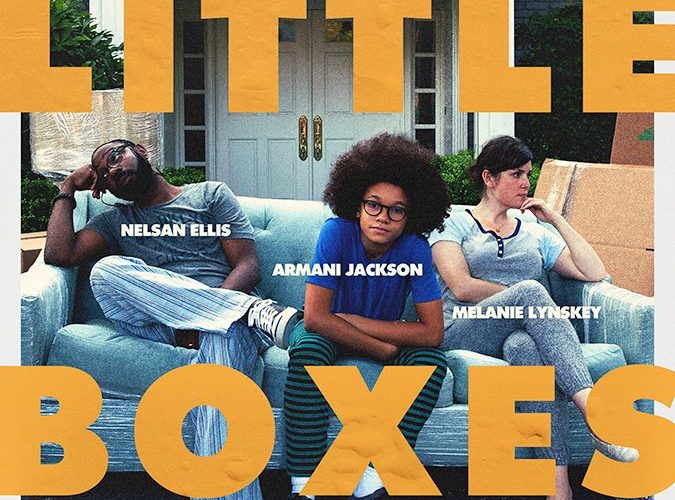With its picket-fence sameness and routine tedium making it a hot bed for deep-rooted repression — at least as depicted in many a film — the horrors of suburbia have been captured in virtually every genre. Little Boxes, directed by Rob Meyer and written by Annie J. Howell, employs this setting to explore societal racism with a grounded, realistic approach, making it all the more alarming. However, while this specific exploration proves to be effective, the drama around which it’s built becomes increasingly unimaginative.
Saying goodbye to their friends in Brooklyn, Mack (Nelsan Ellis) and Gina (Melanie Lynskey) head to the fictional town of Rome, Washington, where the latter has accepted a new tenure-track job teaching photography at the local college, giving her husband the ideal excuse to finally crack his long-gestating second novel as he dabbles in gastronomy journalism (aka writing about YouTube cooking videos). This means their son, Clark (Armani Jackson), has a short time to make new friends before his sixth-grade school year starts. The only option presented: two nearby, popular girls, Ambrosia (Oona Laurence) and Julie (Miranda McKeon), who are over-joyed because they “needed a black kid” in their all-too-white town.

Meyer, making his second feature after A Birder’s Guide to Everything, brings a slack tone and unassuming, albeit pleasant aesthetic to this drama — and comedy, for that matter — even if his focus ultimately gets muddled. As Clark sits through uncomfortably amorous dance routines from his new “friends” as they awkwardly and unintentionally bring up his race, his father is dealing with the same sort of built-in racism from an overbearingly cookie-cutter white neighbor (David Charles Ebert). Meanwhile, a deeply strained subplot plays out with Gina and her new co-workers (Janeane Garofalo, Veanne Cox, and Nadia Dajani) as they blow off a day of preparation to get drunk at a local bar.
As these three strands come to a head, the lack of solid perspective from any character means each of them gets a short shrift. Ellis, who imbues Mack with an appealing nonchalant quality (especially directed towards his over-eager community), comes away the most well-defined, trying to keep his once-close-knit family unit intact in their bland new surroundings. Lynskey, the most proven actor in the ensemble, does her best in trying to flesh out a one-note character, yet never makes much of an impact. As for Clark: the film’s most dramatic moments center on his evolving — or rather regressing, as it pertains to backward-thinking prejudices — relationship with the pair of neighborhood girls. In what turns into an exploration of burgeoning sexuality, this portion feels like it could warrant a film unto itself, with the results here feeling only half-thought-out.
Little Boxes does have moments of authentic connection, as Gina explains to her son why she doesn’t want him to latch onto demeaning female body images in media and his father proceeds by having an exhausted moment of silence rather than lecture him. Despite the contrived drama surrounding it, this is a refreshingly uncynical portrait of familial strife. It’s commendable that Meyer’s sophomore feature, produced by Cary Fukunaga, zeroes in on the racial divide in suburbs across America and the complex effects it has on a nation of adolescents. One only wishes the uninspired story had something deeper to say about such a vital issue.
Little Boxes premiered at the 2016 Tribeca Film Festival and opens on April 14.

